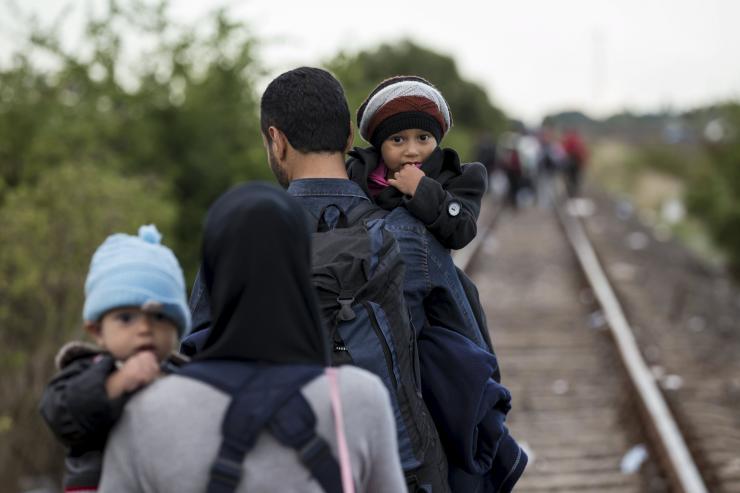Quotas Suggested To Deal With European Migrant Crisis
The current European migrant crisis resulted to an influx of migrants into Europe, which indicates it is necessary for EU member states to increase efforts in dealing with it, according to Chancellor Angela Merkel of Germany.
Merkel suggested the setting of quotas for each EU country in the number of migrants they will accommodate. Most of the migrants are refugees from Syria. Merkel said during a news conference in Berlin with Prime Minister Stefan Lofven of Sweden that it was necessary to solve the European migrant crisis in the spirit of European solidarity.
Merkel said Germany and Sweden are taking up most of the responsibility in the crisis and it was necessary to implement a common asylum policy in Europe.
Merkel added an existing international treaty establishing the responsibilities of each country in receiving refugees is out of date. She also said Italy and Greece cannot receive everyone going across the Mediterranean Sea searching for safe haven. Merkel said fairly divided quotas are necessary in dealing with the current European migrant crisis. The division is currently not fair, Merkel added.
A number of countries, specifically Eastern European countries, are against quota proposals since they said they lack resources. German authorities revealed that they expect asylum applications for this year to be around 800,000. German Vice Chancellor Sigmar Gabriel said Germany can receive around 500,000 refugees every year in the next few years.
The past few days saw the arrival of thousands of refugees, mainly Syrians, who passed through Austria and Hungary after travelling over land across the Balkans. In some instances, the entry of migrants cannot be controlled by authorities. Hundreds of migrants recently broke police lines before leaving the holding area along the border of Serbia and Hungary.
The arrival of a huge number of migrants in Hungary resulted to the current European migrant crisis as the Hungarian government asked for the implementation of rules on the registration of new migrants in the first EU country they arrive in. Austria and Germany relaxed rules after seeing the chaos happening in Hungary. The two countries allowed thousands of people to enter without having to undergo the standard process.
Even as the influx of migrants was eased by the move, thousand of migrants are still coming in. Tensions rose on Tuesday in a field along the border of Serbia and Hungary as migrants became frustrated while waiting in crude conditions before they can continue with their journey. Germany and Austria said on the same day they are having difficulties in keeping up with the influx of migrants and it was necessary for the pace to slow down.
Wolfgang Bachkoenig, spokesman for the Burgenland state police, said over 16,000 migrants have entered Austria since last week. Nearly all the new arrivals travelled into Germany with a good number of people being received by the city of Munich. Chancellor Werner Faymann of Austria said it was necessary to shift from implementing emergency measures in dealing with the European migrant crisis to a more humane way that complies with the law.
The UNHCR said this year saw over 366,000 migrants and refugees travelling across the Mediterranean and into Europe. UNHCR spokeswoman Melissa Fleming said around 20,000 individuals reached Lesbos Island. Another 10,000 are already in other islands in Greece. She added that around 7,000 have entered Macedonia on Monday.
Even as 2,800 individuals were unable to complete the journey, an uncertain future in Europe awaits those who make it across since each country have different approaches in dealing with people seeking asylum. The open-border policy of EU countries allows people to move freely among member countries.
While Germany and France along with some EU countries are willing to accept more migrants, Hungary and other countries have slowed down the influx of migrants. A barbed wire fence was built along the border with Serbia on the orders of the Hungarian government.
Secretary-General Ban Ki-moon of the UN discussed the European migrant crisis with the leaders of Germany, Austira, Hungary, the Czech Republic, Slovakia and Poland. Spokesman Stéphane Dujarric revealed that Ban highlighted the right of migrants and refugees in seeing asylum without being discriminated upon.
